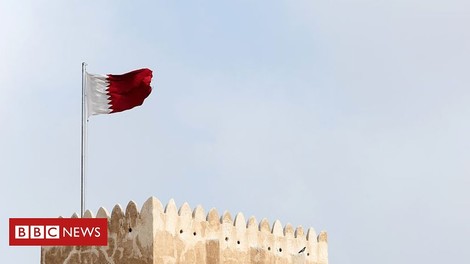Your podcast discovery platform
Curious minds select the most fascinating podcasts from around the world. Discover hand-piqd audio recommendations on your favorite topics.

piqer for: Boom and bust Global finds
I am a Dutch journalist, writer and photographer and cover topics such as human rights, poverty, migration, environmental issues, culture and business. I’m currently based in The Hague, The Netherlands, and frequently travel to other parts of the world. I have also lived in Tunisia, Egypt, Kuwait and Dubai.
My work has been published by Al Jazeera English, BBC, The Atlantic's CityLab, Vice, Deutsche Welle, Middle East Eye, The Sydney Morning Herald, and many Dutch and Belgian publications.
I hold an MA in Arabic Languages and Cultures from Radboud University Nijmegen and a post-Master degree in Journalism from Erasmus University Rotterdam. What I love most about my work is the opportunities I get to ask loads of questions. Email: [email protected]
Did Qatar Make The Biggest Ransom Payment In History?
28 members of Qatar's ruling family were kidnapped while hunting for falcons in Iraq on 16 December 2015.
This fascinating story is about the negotiations that took place in texts and voicemails sent between Qatar’s foreign minister and Qatar's ambassador to Iraq.
These were obtained by a government hostile to Qatar and passed to the BBC.
The transcripts were leaked, to the Washington Post, in April 2018. After officials in Doha issued denials, they sought to embarrass Qatar by releasing the original audio recordings.
The kidnappers (from Kataib Hezbollah, an Iraqi Shia militia supported by Iran) asked money and demanded that Qatar should leave the Saudi-led coalition battling Shia rebels in Yemen and should secure the release of Iranian soldiers held prisoner by rebels in Syria.The hostages had been split up—the royals were put in a windowless basement; their friends, the other non-royals, and the non-Qataris in the party, were taken elsewhere and given better treatment and food.
Sixteen months later, the Qatari hostages were released. All were "fine", the ambassador reported, but "they lost almost half of their weight".
The source maintains that more than $1bn was paid, plus $150m in kickbacks, much of it destined for Kataib Hezbollah.
Qatari officials confirm that a large sum in cash was sent—but they say it was for the Iraqi government, not terrorists. The payments were for "economic development" and "security co-operation".
Shortly after the money was flown to Baghdad, Saudi Arabia, the United Arab Emirates, Bahrain and Egypt began their economic blockade of Qatar. They accuse Qatar of having a "long history" of financing "terrorism".
